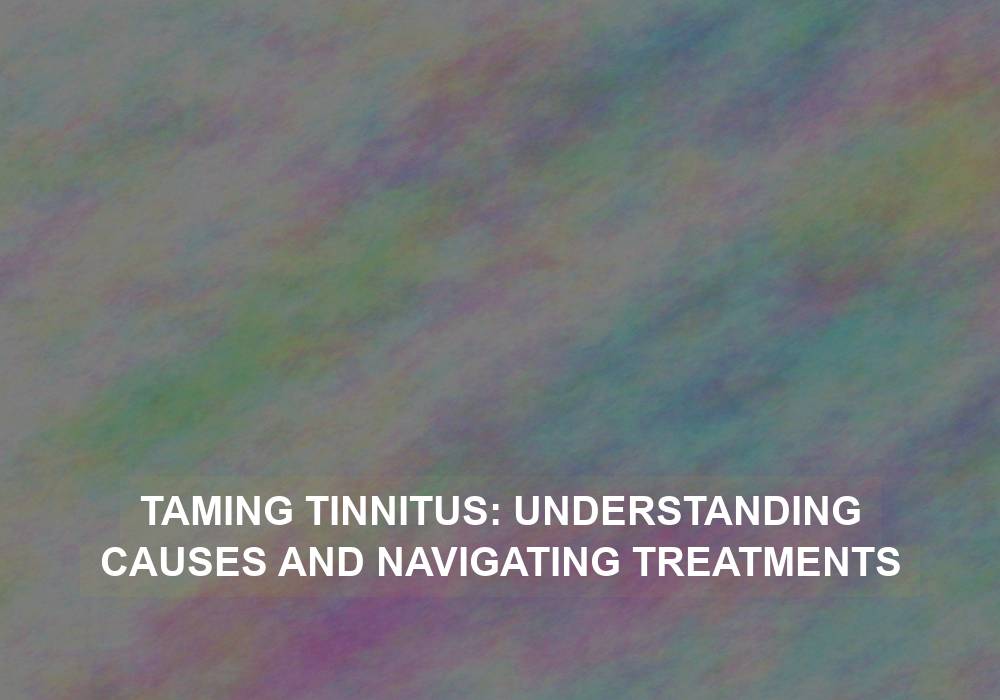Tinnitus is a condition that affects millions of people worldwide. It is characterized by the perception of noise or ringing in the ears, which can significantly impact quality of life and daily functioning. In this article, we will explore the various causes of tinnitus and discuss different treatment options available to effectively manage this condition.
Understanding Tinnitus
Tinnitus is not a disease in itself, but rather a symptom of an underlying condition. It can be described as the perception of sound in the absence of any external noise source. The sound experienced by individuals with tinnitus can vary widely, ranging from ringing and buzzing to hissing and clicking. Moreover, tinnitus can be constant or intermittent, and its intensity can vary from person to person.
Causes of Tinnitus
Age-related hearing loss: As we age, the cells in our inner ear gradually deteriorate, leading to hearing loss and the potential development of tinnitus. This age-related hearing loss, known as presbycusis, is a common cause of tinnitus in older adults.
Exposure to loud noise: Prolonged exposure to loud noises, such as in construction sites, concerts, or through the use of headphones at a high volume, can damage the delicate hair cells in the inner ear, resulting in tinnitus. This is known as noise-induced tinnitus.
Earwax blockage: Excessive accumulation of earwax can obstruct the ear canal, causing irritation and tinnitus symptoms. Removing the earwax blockage can often alleviate the tinnitus.
Medications: Certain medications, such as high doses of aspirin, antibiotics, antidepressants, and diuretics, can trigger tinnitus as a side effect. If you suspect that your medication is causing tinnitus, it is important to consult with your healthcare provider to explore alternative options.
Medical conditions: Underlying health conditions like Meniere’s disease, temporomandibular joint (TMJ) disorders, and cardiovascular problems can contribute to the development of tinnitus. Managing these underlying conditions can help alleviate tinnitus symptoms.
Diagnosing Tinnitus
If you suspect you have tinnitus, it is essential to consult an audiologist or an otolaryngologist (ear, nose, and throat specialist) for a comprehensive evaluation. The healthcare professional will conduct a thorough examination and may use various tests to determine the cause and severity of your tinnitus.
Pure-tone audiometry: This test measures your hearing ability, helping to identify any hearing loss that may be associated with tinnitus. It involves listening to tones at different frequencies and indicating when you can hear them.
Tinnitus pitch matching: During this test, you will be asked to match the pitch of your tinnitus sound using external tones. This helps the healthcare professional understand the frequency of your tinnitus and can guide treatment options.
Tinnitus loudness matching: This test helps determine the loudness of your tinnitus compared to different external tones. It helps quantify the severity of your tinnitus and aids in treatment planning.
Once a diagnosis is confirmed, the healthcare professional can recommend appropriate treatment options based on the underlying cause and severity of your tinnitus.
Navigating Tinnitus Treatments
Sound therapy: Sound therapy aims to provide external sounds that can distract and reduce the perception of tinnitus. This can be achieved through the use of white noise machines, hearing aids with built-in sound generators, or smartphone apps that offer a variety of soothing sounds. The idea behind sound therapy is to shift the focus away from tinnitus and provide relief.
Cognitive behavioral therapy (CBT): CBT is a psychological therapy that can be effective in managing tinnitus. It helps individuals develop coping strategies and change negative thought patterns associated with tinnitus. Through CBT, individuals can learn to reduce the emotional distress caused by tinnitus and improve their overall well-being.
Medications: In some cases, medications may be prescribed to alleviate tinnitus symptoms. These can include tricyclic antidepressants, anticonvulsants, or even off-label use of certain medications for specific cases of tinnitus. Medications are typically used when tinnitus is severe and significantly affects daily life.
Tinnitus retraining therapy (TRT): TRT combines sound therapy with counseling to help individuals habituate to their tinnitus. By retraining the brain’s response to tinnitus, it aims to reduce the perception and emotional distress associated with the condition. TRT is a long-term therapy that requires patience and commitment.
Lifestyle modifications: Making certain lifestyle changes can also contribute to managing tinnitus effectively. These can include avoiding exposure to loud noises, maintaining a healthy diet, managing stress levels, and getting regular exercise. These lifestyle modifications can help improve overall well-being and reduce the impact of tinnitus on daily life.
It is important to note that there is no one-size-fits-all approach to treating tinnitus. The choice of treatment will depend on the individual’s specific needs and the underlying cause of their tinnitus. Consulting with a healthcare professional specialized in tinnitus management is crucial to determine the most suitable treatment plan.
Conclusion
Tinnitus can be a distressing condition, but with proper understanding and management, its impact on daily life can be minimized. By recognizing the various causes of tinnitus and exploring the available treatment options, individuals can take steps towards taming their tinnitus and achieving a better quality of life. If you or someone you know is struggling with tinnitus, seek professional help and embark on a journey towards effective tinnitus management.
